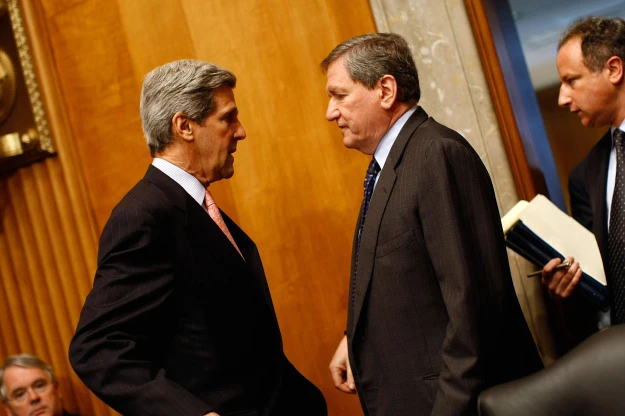Pakistan’s dire fiscal situation has resulted in the reduction of development spending by 40 per cent. This does not bode well for the citizens who have been tormented by an energy crisis, persistent food inflation and rampant unemployment. In these circumstances, the development assistance under the Kerry-Lugar Bill (KLB) is much needed. Pakistan’s civilian government braved a media onslaught and the ire of the security establishment for tacitly supporting the US legislation. Other than the rhetoric around the ‘condition’ drafted in Washington, there was an unstated agreement that the development assistance was welcome.
Months have elapsed and Pakistanis have yet to witness the roll out of the KLB. Global recession and political uncertainty at home underlie the tough days for Pakistanis especially the poor. It was expected that given the urgency of the situation, USAID was going to kickstart the delivery of its interventions. Well, the progress so far has been disappointing.
First, there seems to be no public sign of a consensus within the US bureaucratic machine how the aid under KLB will be delivered. Unconfirmed media reports suggest that the political versus the bureaucratic channels are not on the same page. The ‘political’ administration is ostensibly managing USAID systems and processes. There may be strategic reasons for that but the net result is that things are delayed. Not long ago, Pakistani government’s procedures were thought to be a problem but the trajectory of US bureaucracy only proves that public sector ailments are common.
Second, USAID is unfamiliar with the methods of working with the governments. In fact, its operations keep the government systems out of the programme design and create parallel structures for big US firms for accountability and results. On the ‘results’ front the experience of USAID has not been flattering to say the least. The case of irregularities in the ongoing FATA programme, highlighted by the media in recent months, is a case in point.
Third, there is no clear roadmap for the key priorities that KLB will help address. We read about the energy sector support and other immediate responses to Pakistani government’s needs. But surely, the sizeable pipeline of 7.5 billion needs to be well planned. Needs identification and programme design should be responsive as well as flexible. Bureaucracies are averse to out of box thinking; and perhaps this is what explains lack of alternatives to lengthy, US firms-centric approach typically employed by USAID.
Finally, the capacity of the US aid handlers seems to be as problematic as that of Pakistani government and nongovernmental channels. Delays define the culture of aid and in our case; the government machinery and business processes are unable to execute development budgets even when they are available.
Aside from the ideological debates whether we should be using foreign aid or not (and there are good reasons to engage in this debate), it is time for action. Further delay is only going to lengthen the lunatic shadows of anti-Americanism here. US will be seen to breaking yet another promise.
For the US administration it is imperative that modalities of aid delivery are finalized. There is of course no one solution to this dilemma. Foremost, budgetary support is critical: to restore the development budget, handle the circular debt to overcome the energy crisis and undertake major investments in water sector.
By the time, KLB will be operational Pakistan will be a changed polity. Assuming that the 18th amendment is fully implemented by July 2011, the locus of power and development planning would shift to the provinces. This is why US administration needs to do business with the provincial and (yet to be defined) local governments. Thus USAID needs decentralization in the host country as well.
But provincial capacities in Pakistan remain weak to manage aid budgets and convert resources into results. As provinces redefine their operations, and settle power distribution with local governments, this is a critical time for USAID to enter into constructive engagement with provincial governments. Under the Paris declaration other donors have agreed to use country systems to achieve aid effectiveness. Pakistan is an alliance of provinces and not a small, easy to fix unitary state where directives from Islamabad will be blindly followed.
The donors’ community known for its competitive posturing, fragmentation and duplication also needs to assess how it is going to work with Pakistan. KLB will be an unprecedented grant for Pakistan. But other donors have experience of working here far more than US, which had closed shop in the 1980s. Thus pooling of donor expertise and knowledge base is also an area for immediate action.
Pakistan has suffered badly due to the crisis in Afghanistan and being a partner of US strategies since the late seventies. It cannot be treated as just another ‘poor’ country where a routine USAID operation will do. It is a transitional society undergoing political and institutional change. Therefore, development remedies for this context need to be extraordinary and not cut and paste solutions. Having said that, the KLB needs an immediate rollout. The delay will take away its cutting edge and further diminish the dwindling credibility of the US.
Raza Rumi is a policy advisor and a writer based in Lahore. He blogs at www.razarumi.com manages Pak Tea House and Lahore Nama cyberzines
An edited version of this piece was published in the Express Tribune, May 21st, 2010.



